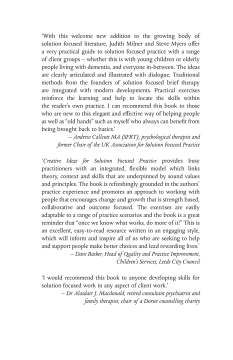
Additional Information
Book Details
Abstract
Exploring creative ways to implement solution focused practice, this book is packed full of ideas to inspire ways of working with clients which focus on their strengths as a means to finding solutions.
Outlining how and why strengths-based interviewing for solutions is effective, the book provides a wealth of different ways to apply key solution focused techniques. With exercises, sample questions and top tips for tricky situations, the authors show how to apply creative methods in a variety of different settings and with different service user groups.
Suitable for use with children and adults, this accessible book will offer exciting ideas for those new to solution focused working as well as more experienced practitioners looking for inspiration.
With this welcome new addition to the growing body of solution focused literature, Judith Milner and Steve Myers offer a very practical guide to solution focused practice with a range of client groups - whether this is with young children or elderly people living with dementia, and everyone in-between. The ideas are clearly articulated and illustrated with dialogue. Traditional methods from the founders of solution focused brief therapy are integrated with modern developments. Practical exercises reinforce the learning and help to locate the skills within the reader's own practice. I can recommend this book to those who are new to this elegant and effective way of helping people as well as 'old hands' such as myself who always can benefit from being brought back to basics.
Andrew Callcott MA (SFBT); Psychological Therapist. Former Chair of UK Association for Solution Focused Practice
Creative Ideas for Solution Focused Practice provides busy practitioners with an integrated, flexible model which links theory, context and skills that are underpinned by sound values and principles. The book is refreshingly grounded in the authors' practice experience and promotes an approach to working with people that encourages change and growth that is strength based, collaborative and outcome focused. The exercises are easily adaptable to a range of practice scenarios and the book is a great reminder that 'once we know what works, do more of it!' This is an excellent, easy-to-read resource written in an engaging style, which will inform and inspire all of us who are seeking to help and support people make better choices and lead rewarding lives.
Dave Basker, Head of Quality and Practice Improvement, Children’s Services, Leeds City Council
Yet another supremely practical guide to solution focused practice from the creative Judith Milner and Steve Myers, which has plenty to offer to both the experienced and newcomers to the field. Plainly written and full of useful activities, it will be a welcome addition to any solution focused practitioner's bookshelf.
Guy Shennan, independent consultant in solution focused practice and Chair of the British Association of Social Workers
Previously a senior lecturer in social work, Judith Milner recently retired from work as a therapist, consultant and independent expert to family courts in child protection, domestic violence and contested contact cases. She is widely published on solution focused practice. Steve Myers is Director of Social Sciences at University of Salford, Manchester. A social work academic since 1995, he has led research projects and has authored and co-authored a series of books and articles about violence, sex and solutions. Judith and Steve both live in Yorkshire.
I would recommend this book to anyone developing skills for solution-focused work in any aspect of client work.
Dr. Alasdair J. Macdonald, retired consultant psychiatrist and family therapist; chair of a Dorset counselling charity
Table of Contents
| Section Title | Page | Action | Price |
|---|---|---|---|
| Creative Ideas for Solution Focused Practice - Inspiring Guidance,Ideas and Activities by Judith Milner and Steve Myers | 5 | ||
| Introduction | 11 | ||
| 1. Solution Focused Philosophy | 13 | ||
| Practice principles and assumptions | 22 | ||
| Practice principles | 33 | ||
| Empathy | 33 | ||
| Validating emotions with a hint of possibilities (Rogers with a twist) | 37 | ||
| Listening | 38 | ||
| 2. Practice Principles and Techniques | 58 | ||
| Beginning the conversation | 59 | ||
| Externalising the problem | 68 | ||
| Exceptions | 71 | ||
| Strengths | 79 | ||
| Developing goals | 90 | ||
| Evaluating the session | 128 | ||
| 3. Specific Contexts | 133 | ||
| Terminally ill people | 133 | ||
| Suicide | 137 | ||
| People with chronic illness or disability | 141 | ||
| People who hear voices | 143 | ||
| People who are disabled with stress | 146 | ||
| 4. Surviving Trauma and Violence | 148 | ||
| Survival questions | 150 | ||
| Survival of poor parenting scale | 151 | ||
| Safety and control | 153 | ||
| Bedtime therapy | 154 | ||
| 6,5,4,3,2,1 | 157 | ||
| Being sensibly selfish | 158 | ||
| Doormat therapy | 160 | ||
| Comfort cues | 161 | ||
| Treats | 164 | ||
| Living well is the best revenge | 164 | ||
| Internet Resources | 167 | ||
| References | 168 | ||
| Index | 171 |
